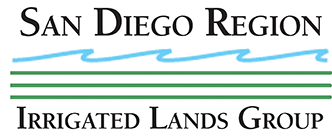
Water Issues
Since the escalation of water pricing beginning in the early 1990’s, price has been the chief water concern of farmers in San Diego County. Now, with the region’s imported water sources under siege at the source from drought conditions and regulatory actions, the concern has shifted to availability. While there are no remedies for ongoing drought or dry conditions, there are several actions that can be taken to help ensure sufficient supplies are available for local farmers.
First, more than one-half of the water used by San Diego County’s urban population is for landscape irrigation. The urban landscape is an important part of the community, but it is often the case that excessive amounts of water are used. It is important that residents are taught proper techniques on using just the right amount of water at just the right time. Second, local supply development must be maximized. In San Diego County that means water recycling and desalination. And third, important improvements to the state’s water infrastructure must be made. That includes repairs to the ailing Sacramento/San Joaquin Delta that supplies 60 percent of southern California’s imported water and creating more storage for water that can be gathered in wet years.
The San Diego County Farm Bureau works closely with the California Avocado Commission sponsored Southern California Ag Water Team in monitoring actions of the Metropoliton Water District of Southern California and the San Diego County Water Authority. Local water agencies must be paid attention to as well, and several Farm Bureau members sit on local water boards.
San Diego Region Irrigated Lands Group
Administered by the San Diego County Farm Bureau
website: www.sdirrigatedlandsgroup.org

SDRILG: Enrollment
The California Regional Water Quality Control Board, San Diego Region (San Diego Water Board) is responsible for making certain that local government and businesses are in compliance with state and federal runoff regulations. Locally, for commercial agriculture the General Agricultural Orders (Ag Order) format was selected to replace Waiver No. 4, the previous regulation.
The regulations allow for two options:
Option 1: Conduct the testing and reporting as a group
Option 2: Act individually to submit plans and testing results directly to the Regional Board
The San Diego County Farm Bureau is providing members with the collective testing and reporting option through the San Diego Region Irrigated Lands Group (SDRILG).
In order to enroll, you must be a member of the San Diego Farm Bureau.
